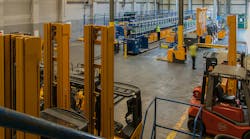The factory is being evacuated and filled with advanced production equipment that requires totally different skills, often remote, than just a few years ago. The jobs we think are going to China are often actually going into history.
Did you know you were a social problem? Seems you're doing so well in terms of productivity, efficiency and automation in general that you and your company and thousands of other American producers are not going to hire anywhere near as many new people as you did years ago.
In fact, the proportional numbers of people directly employed in manufacturing in the United States (and in the rest of the world, except perhaps China and Mexico) has been declining for generations. Today, we have less than 12.5 percent in industry. That compares to around 25 percent of us working in factories in 1960. Yet, manufacturing output has grown more than 10 times since then — with half the people!
Looking even further back, in the days before and after World War II, manufacturing was the job choice for most men and many women. Those of you over 60 can recall when one symbol of America's greatness was a smoke stack, and industry was indeed on parade.
Today it seems manufacturing is not so much marching overseas as marching out in terms of people needed in the plant. Fewer and fewer of us go to work operating machines or working near a conveyor belt. Yet, those technologies are busier than ever — with far fewer operators and attendants.
Fifty years ago, a new steel plant meant thousands of jobs. Today, it might mean a few dozen. An auto assembly plant, here or in Germany, Japan or, in a few short years, China, will not need the crowds that used to show up for each shift. In fact, some new auto plants in Germany operate at night with a security detail and a few maintenance workers. The plants look empty, but they are operating and operating very, very well.
Manufacturing managers have not employed lots of new people because they have deployed state-of-the-art systems integration. They are turning out more and better products at higher rates and lower costs than ever. The trend is clear. The factory world is being evacuated even as it becomes more and more successful — and profitable — here and all over the world. That, ladies and gentlemen, is an employment social problem and a big one.
The analogy often noted is American farming. Once there were millions of family farms worked by millions of Americans. Today, we grow crops with the assistance of marvelous machines: combines, super-productive tractors and automation of all manner. We farm fish with the same productivity successes as we find in poultry farming. Thus we have cheap, abundant food with less and less labor. To help us all appreciate that and to see that it continues, we have a Department of Agriculture and a secretary in the president's cabinet. For similar reasons, we need a Cabinet-level Department of Manufacturing.
Manufacturing is evolving with ever-higher speeds into a more and more automatic and hightech kind of work. The factory is being evacuated and filled with advanced production equipment that requires totally different skills, often remote, than just a few years ago. The jobs we think are going to China are often actually going into history. This doesn't mean, however, that we will not need lots of people to work for manufacturing companies. On the contrary, the kinds of skills modern industry requires we often import from countries like China and India.
We need someone who can keep the American people and its government up-to-date and properly informed about these issues — lest whoever is the next president and the next Congress start to approach industry's labor situation as a social employment problem rather than the results of structural and technological change in manufacturing. Manufacturing, however, is too important to be left to historical forces alone. America without leadership in manufacturing is not America.
Right now I don't have any special solutions to this "missing jobs" problem. Is governmentfinanced retraining part of the solution? More research and more seed money for entrepreneurs? More aid to manufacturing-oriented education? Such ideas and such problems should be discussed and developed by someone who is an expert on industry and who can speak for manufacturing at the highest level of the government. We need a Department and a Secretary of Manufacturing — not another title in Commerce. This is the producer country. It has been for well over a century. Let's keep it so in this century.




